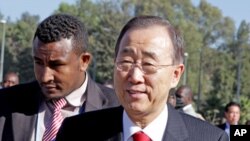United Nations Secretary-General Ban Ki-moon says African criticism of the International Criminal Court is unfounded. Ban spoke to VOA's Peter Heinlein about the court and other issues, on the sidelines of the African Union summit in Addis Ababa.
The U.N. secretary-general takes exception to suggestions that the ICC record of prosecutions shows an anti-African bias. Critics point out that the seven active ICC investigations are all in Africa.
In comments to VOA, however, Ban rejected the bias charge, arguing that African governments have, in most cases, supported the ICC actions.
“On many occasions when African people were indicted, they were indicted at the request of the African countries themselves. And, there were very few cases that investigations were instigated by ICC itself," said Ban.
The outgoing chairman of the Africa Union, Equatorial Guinea President Teodoro Obiang Nguema, used his farewell speech at the summit to denounce the ICC and suggest that Africa should create its own criminal court.
Ban counters that the ICC has performed well recently in ending what he calls the era of impunity in Ivory Coast and Libya.
“I think the examples and lessons we have seen in the case of Cote d'Ivoire and Libya was a very positive one in that everything was moving toward the right direction in terms of establishing international justice and putting an end to impunity and putting all these perpetrators to justice. We're now working very hard in these countries to establish transitional justice. Therefore, an era of impunity has come to an end,” said Ban.
On other matters, Ban hailed as historic the recent relocation to Mogadishu of the United Nations Political Office on Somalia. The move marks an end to a 17-year period in which the world body had no permanent presence in the Somali capital. He called this moment when al Shabab insurgents are on the run a small window of opportunity for Somali’s future stability. He said he will recommend that the Security Council approve an expansion of the African Union's AMISOM peacekeeping force from 10,000 to 17,000 troops before a major conference on Somalia in mid-February.
“I'm going to make a report to the Security Council very soon. I hope Security Council will have a favorable consideration on this increase in the strength of AMISOM before we meet in London for International Conference on Somalia,” said Ban.
The secretary general also called Sudan President Omar al-Bashir an obstacle to peace, and said the Sudan-South Sudan dispute about oil is a threat to regional security. The comments come after regional leaders failed at meetings here in Addis Ababa to agree on transit fees and sharing oil revenues, prompting South Sudan to implement a total shutdown of oil production.
South Sudan controls more than 70 percent of the two countries’ oil output, but needs pipelines running through Sudan to get the oil to port.
UN Chief Rejects African Criticism of International Court




